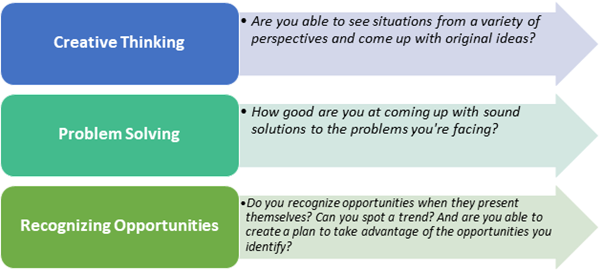“The problem is never how to get new, innovative thoughts into your mind, but how to get the old ones out. Every mind is a room packed with archaic furniture. Make an empty space in any corner of your mind, and creativity will instantly fill it.” – Dee Hock, Founder of VISA

Creativity is one of the most important elements of entrepreneurship and may be one of the keys to developing entrepreneurial skills.
Entrepreneurs need to be observant and notice what people need (demand), find a solution (supply), sell that solution at a price people will pay, make a profit, deal with competition ... and the list goes on.
However, creativity is not only about problems. It is about being able to visualize and to think ahead, to move ahead. Creativity is the stepping-stone to innovation and is also part of self-actualization, or how we realize our personal potential.
Above all, creativity arises when there is a pressing need. Entrepreneurs constantly ask themselves: “Is there a need of my product or service? Alternatively, will it have to be created? Do I think my idea has some realistic need and is beneficial toward that? Can I pinpoint the issue your idea resolves?”
What are the key components of the creative process?
- imagination
- originality (the ability to come up with ideas and products that are new and unusual)
- productivity (the ability to generate a variety of different ideas through divergent thinking)
- problem solving (application of knowledge and imagination to a given situation)
- the ability to produce an outcome of value and worth
Creativity is also closely connected with an individual’s personality and emotional life because it involves:
- personality traits, such as self-confidence, tolerance fod uncertainty, curiosity and motivation
- emotional processes, such as emotional fantasy in play, pleasure in challenge, involvement in tasks and tolerance of anxiety
- cognitive abilities, such as divergent thinking, ability to ‘transform’ thinking (for example, by being able to reorder information or shift thinking ‘sets’), sensitivity to problems, breadth of knowledge and judgment.
Therefore, creativity is crucial for entrepreneurs, regardless the professional field and the economic sectors they work in.
How does creativity helps entrepreneurs achieve success?
There are multiple forms in which it can do that. Here are some of the most representative:
Creating new ideas for competitive advantage. The whole process of entrepreneurship is rooted in creation and exploration of new ideas. When an entrepreneur is able to generate a new idea that is feasible as well as efficient, it gives him/her an edge over the competition. The ability to explore different niches is just like a learned skill or a resource that is possessed by an individual.
Thinking of new ways to develop product and improve the business. Creativity helps develop new ways of improving an existing product or service and optimizing a business. There is always room for improvement in the deliverables of an enterprise; it is the creative entrepreneur who can assess how to do it.
Thinking the unthinkable. Creativity requires imagination to produce the most obscure ideas. Imagination is needed to cross the boundary of “usual” and “normal” or to think outside the box. This allows entrepreneurs to think beyond the traditional solutions, come up with something new, interesting, versatile, and yet have success potential.
Finding similar patterns in different areas. Sometimes, due to following a routine or a habit, the thinking process also goes along the line of those established processes. Creativity enables people to connect different and unrelated subjects and make successful entrepreneurial ideas. Merging different fields creates interesting intersections that creates new niches. Most people are afraid of bringing different disciplines together, but most interesting ideas come from colliding different fields.
Developing new niches through creativity and entrepreneurship. In entrepreneurship, it is important that new aspects of traditional business are explored. This can be in the form of changing the method of manufacturing the product or delivering the service or how are they supplied to the user. All these areas can create a niche that has great potential in business.
The entrepreneurial creative process, step by step
The basic stages of the entrepreneurial creative process implying specific skills include:
1. Preparation
The creative process starts by identifying a problem and then doing more research. This is done in an effort to start looking for a viable solution. An entrepreneur looks in every direction to solve the problem, be it inside the industry or outside.
2. Thinking outside the box – going beyond the comfort zone
Can we achieve anything if we are not willing to go beyond our comfort zone? One has to leave the comfortable arena, go beyond and take a risk. Rewards come with efforts.
3. Creativity is not magical
Creativity is simply approaching things with a different perspective. The simplest approach to creative thinking can be copying different elements, transforming them, combining them and eureka! There is a new idea. This essentially makes use of existing elements. As Kirby Ferguson says, “It happens by applying ordinary tools of thought to existing materials. And the soil from which we grow our creations is something we scorn and misunderstand even though it gives us so much — and that’s… copying.”
4. Incubation
During the incubation stage, ideas that have the potential to solve a problem tend to flourish. This stage is characterized by the unconscious thought process of refining an idea. Apparently, there are many activities at work during this stage, but the overall goal is to find a solution.
5. Illumination
Incubation leads to clarity of ideas. This is the “solution finding” stage. Now the creativity process leads to the knowledge of some practical ideas that can be put to work. It is like a “light bulb” moment, hence it’s called illumination.
6. Verification
This stage determines whether the “found” solution even has the potential to work or not. An idea can either be accepted as such, modified with minor or major changes, or rejected altogether, requiring that the whole process be done again.
7. Critical thinking
The major success of an entrepreneurial endeavour lies in critically assessing the viability of an idea. Critical thinking enables an entrepreneur to self-judge in order to evaluate the idea. It is defined as a self-directed, self-disciplined, self-monitored and self-corrective process of evaluating an idea.
To sum up, some of the key creative skills are:
Creating an idea might be easy; successfully executing it might be a difficult task. What makes a person a successful entrepreneur? Why do some people recognize the opportunities that exist around them and others do not? Are they genetically different? Or do they have a different perspective to handle things?
See things from many different angles. If you think creatively, you will find innovative solutions and improve your decision-making skills.

























